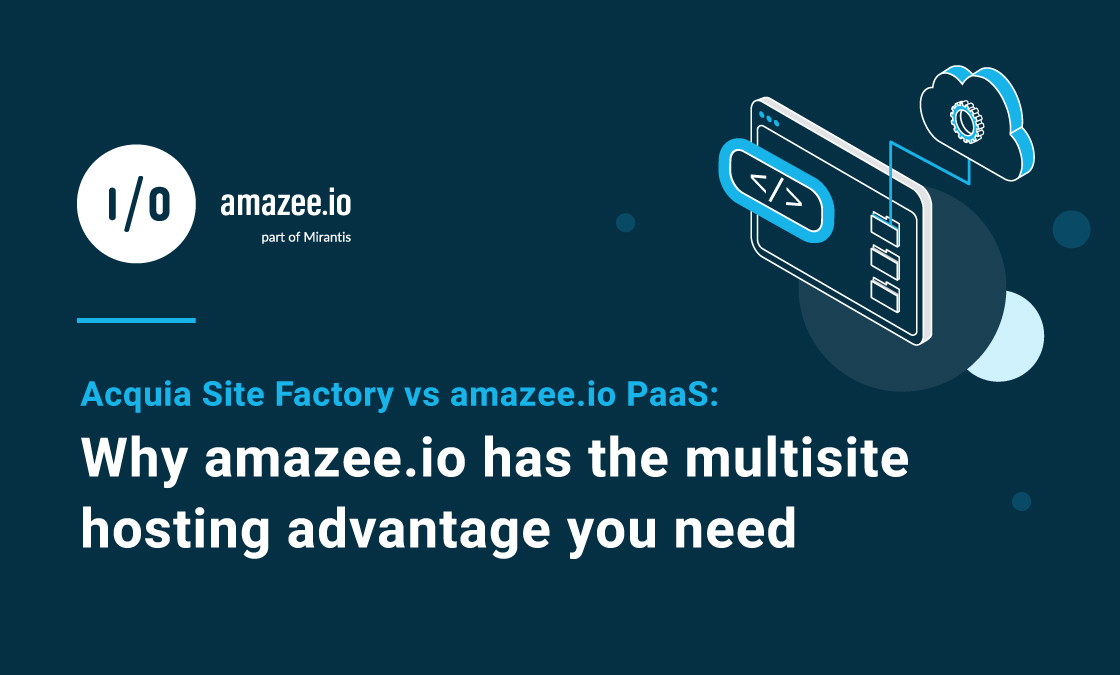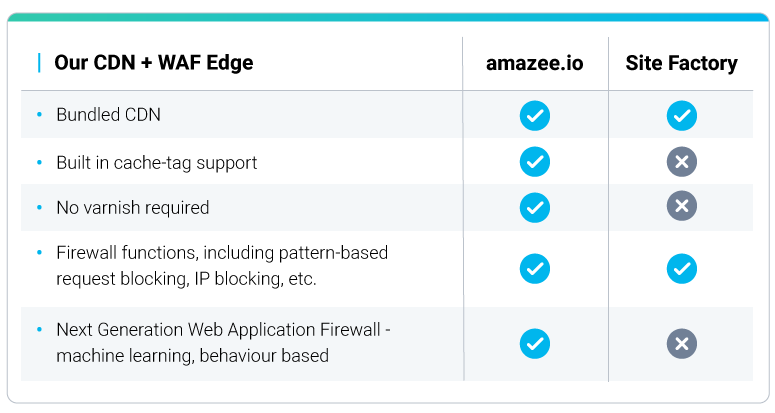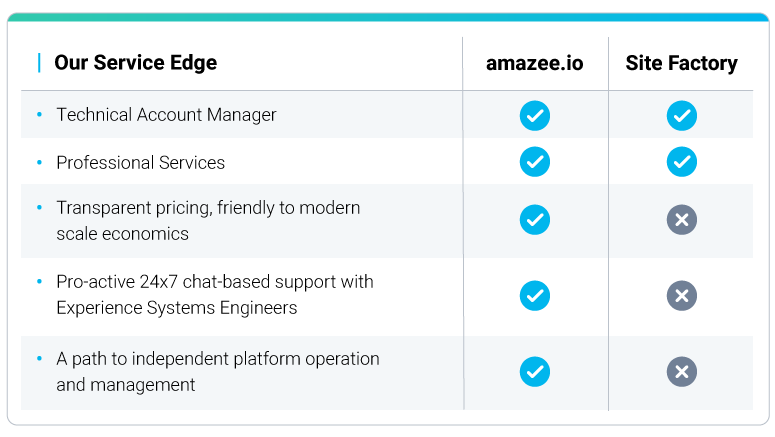Sophia Harris
|Mar 15, 2023
Mar 15, 2023
|5 min read
Search Topic

Acquia Site Factory is a cloud-based platform that promises to help organizations manage and scale their digital Drupal-based experiences. While it makes bold claims, Site Factory may not be the best match for every organization’s needs. Sometimes, it can create more complexity than it solves.
The amazee.io multisite hosting PaaS and Acquia Site Factory are both designed to help organizations manage multiple websites with ease. But there are several key differences between the two. One of the main advantages of the amazee.io platform is its ability to leverage Kubernetes in a battle-hardened and world-class way; where Acquia has just recently moved over to Kubernetes, we’ve been orchestrating containers for years.
This means that users can take advantage of Kubernetes' powerful container management capabilities, ensuring that their websites are always running smoothly and efficiently. amazee.io can host websites in any AWS, GCP, or Azure region, as well as Mirantis Cloud OnPrem solutions like Mirantis MKE, giving users the flexibility to choose the infrastructure that best meets their needs - how it should be.
In contrast, Site Factory has limited infrastructure. While it can be hosted in certain AWS regions, Acquia Site Factory does not support hosting in other cloud providers or on-premises solutions.
Another point of difference between the two platforms is their pricing and vendor lock-in.
amazee.io allows users to pay for their infrastructure directly through their IaaS provider, such as AWS, GCP, or Azure, or even use existing contracts with infrastructure providers. This means that users are not locked into a single vendor or management company, and they can choose the most cost-effective and contextually appropriate solution for their needs. Acquia Site Factory, on the other hand, by default requires users to pay for both infrastructure and services from them, a single vendor, which could lead to higher costs, less transparency, and less flexibility over time.

While the amazee.io multisite hosting PaaS and Acquia Site Factory are both application hosting platforms that offer multisite capabilities for Drupal, they differ significantly in their scope of support for other frameworks and technologies.
amazee.io offers multisite capabilities for any frontend framework, while Acquia Site Factory does not. This means that if you need to host multiple sites that use a different modern frontend approach (such as Decoupled or Headless Drupal sites), amazee.io would be the more flexible option to pick, and you wouldn't have to give up your ability to host multiple sites easily. You can host everything in a single platform, which may even be in your own infrastructure or on-prem.
Amazee.io can also provide completely segregated environments of the same codebase and deploy those environments to any region globally with data sovereignty intact. This means that you can manage your platforms centrally or independently and deploy changes to one site, a selection of sites, or all sites in a platform group. This level of flexibility makes it easier to manage multiple sites from a single location, while also ensuring that each site is hosted in the most appropriate location.
amazee.io provides a fully managed and deeply integrated CDN experience, whereas Acquia Site Factory offers to support a chosen CDN from their list of supported options at the time. We’ll let this chart speak for itself:


amazee.io's support and Technical Account Management are renowned for being personal, with Technical Account Managers who are interactive and engaging. Acquia Technical Account Managers are usually unnamed - although they do offer named TAMs at a much higher rate, and users report their support experience to be slower and more challenging.
On the flip side, amazee.io offers 24X7 human support on Slack, which is easier for most people to manage. We find that that’s just what works. Compare that to Acquia Site Factory's...
amazee.io provides customers with a path to independent platform operation and management, enabling them to eventually manage their platform themselves. In contrast, Acquia Site Factory locks customers into the platform, with no path to independent operation and management.
We’re also proud to offer very transparent pricing that’s friendly to scale economics, which is a rarity in the industry.
From a certification and compliance perspective, both platforms and companies are compliant with several key regulations and standards, including GDPR, CCPA, HIPAA, and PCI DSS. Additionally, both providers operate or have operated under the Infosec Registered Assessors Program (IRAP), which is a key requirement for organizations operating in Australia.
Another area of difference between the two platforms is the timeline for achieving certain certifications. For example, amazee.io is working towards achieving ISO 27001 certification in Q2 2023, while Acquia Site Factory is already certified under this standard. Similarly, amazee.io is planning to achieve SOC 2 Type II and CSA STAR certifications in Q4 2023, while Acquia Site Factory already has these certifications.

If you're looking for a powerful, flexible, and future-facing replacement for Acquia Site Factory, then a multisite hosting PaaS from amazee.io built on the Open Source Lagoon software may be a solid option. amazee.io has been hosting Drupal at scale for over 8 years, and all that experience is baked into the amazee.io multisite hosting PaaS offering.
Acquia has also been hosting Drupal for many years and is often very useful when it comes to hosting many Drupal sites from one codebase, but it is essential to carefully evaluate Site Factory's features, pricing, and support options before committing to it, as it may not deliver the promised benefits or value for your individual business. To help you select the right hosting solution for you and your organization’s needs, we encourage you to book a demo and chat with us here:

